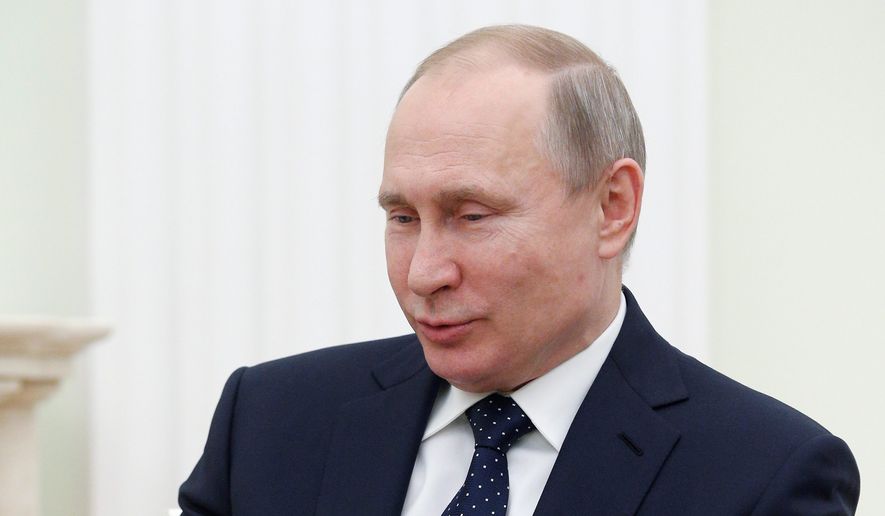The Kremlin officially denied Monday that it meddled in the 2016 U.S. presidential election — the latest example of what Russian analysts say is a clear demonstration of Moscow’s military doctrine of deception known as “maskirovka,” or masking.
The denial — uttered by Russian President Vladimir Putin’s spokesman Dmitry Peskov — was Moscow’s first official response to Friday’s announcement of a U.S. indictment charging 13 Russian nationals and several companies with meddling in the 2016 U.S. presidential election.
“Russia did not meddle, is not in the habit of meddling in the internal affairs of other countries, and is not doing it now,” Mr. Peskov told reporters during a Monday conference call.
But U.S.-based Russia experts insist the sweeping charges brought Friday by special counsel Robert Mueller’s probe bear all the hallmarks of a “maskirovka” mission. The indictment alleges that a complex, multimillion-dollar operation employed a “troll factory,” undercover agents and an army of fake social media accounts to spread hatred online among American voters.
The operation (which dated back to 2014), the Kremlin and its agents also demonstrated a deep knowledge and understanding of American politics, while weaponizing their social media capabilities, says Ariel Cohen, a senior fellow in Russian affairs at the Atlantic Council think tank.
Mr. Cohen told The Washington Times that the troll factory, which was based in St. Petersburg, was coordinated with elite public opinion research that Russians conducted in the U.S.
“Their actions showed an extremely sophisticated analysis and understanding of culture and politics,” he said. “They relied upon people who lived in the U.S., probably studied here, worked here and really studied how the society works.”
With the U.S. preparing to hold its first major balloting since 2016 — November’s midterm elections — Congress and election officials are focusing on how to counter Moscow’s next wave of interference.
Mr. Cohen expressed certainty that Kremlin operatives would continue battling American democracy and said Washington needs to push back as aggressively as possible, as quickly as possible.
“Our retaliation should not stop with the indictments,” he said. “These are matters that endanger our national security. It is not just court actions. There are cyber, economic, and information warfare tools in our national security tool box, and we need to be prepared to fight cyber and information attacks on all levels.”
While the special counsel indictment did not note any collusion between the Kremlin and the Trump campaign, Washington’s intelligence community has largely focused on urging the nation to rise above partisan bickering and protect future elections from Russian interference.
James Clapper, former director of national intelligence in the Obama administration, told CNN that “above all this rhetoric here, again we’re losing sight of what is it we’re going to do about the threat posed by the Russians. He [Mr. Trump] never talks about that. It’s all about himself.”
Last week, current Director of National Intelligence Dan Coats said there is “no doubt” that Moscow viewed its meddling as a success and that the 2018 elections are a target.
On Sunday Sen. Bob Casey, Pennsylvania Democrat, encouraged Mr. Mueller not to release his final report on Russian interference too close to the time of the midterm elections in order to avoid the appearance of partisanship.
“I think it’s a mistake for him [Mr. Mueller] to release it late,” Mr. Casey said while being interviewed in New York. “I think you should wait until after [the election].”
• Dan Boylan can be reached at dboylan@washingtontimes.com.




Please read our comment policy before commenting.